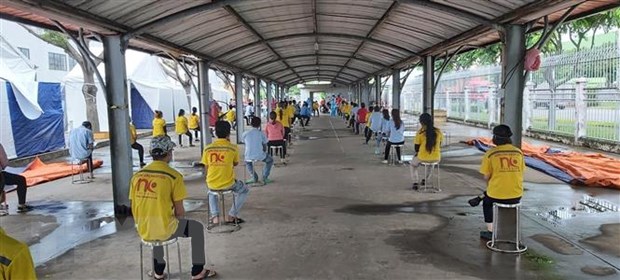 Economy
Economy


|
| Workers at a factory in the southern province of Bình Dương have COVID-19 tests as part of their stay-in operation policy. — VNA/VNS Photo |
HÀ NỘI — Việt Nam should make haste in its efforts to vaccinate its labour force in the agriculture industry and food production, a task force from the Ministry of Agriculture and Rural Development (MARD) has recommended.
The task force stressed the importance of making sure that vital parts of the food supply chain including seafood, livestock, crop processing, and slaughterhouses stay operational. It said only 30 to 40 per cent of workers in said categories were vaccinated according to the latest survey by MARD. As demand for food soars, so does the number of workers required and the risk of chain infection in production facilities.
The ministry also called for the Government to buy agricultural products from farmers to restock the national reserve. This will provide them with a much-needed capital injection to keep their farms afloat while at the same time strengthening national food security.
MARD also asked banks to review short-term loans for agricultural firms. Those who are eligible to receive support may have their credit expanded, receive payment delays, and/or have their interest rates reduced. The ministry has also asked the government to grant firms a reduction in their electricity bills and set up price control measures for vital commodities in parts of the country under social distancing measures.
The good news during the pandemic is the country's agricultural production has been running smoothly, according to MARD. There have not been major outbreaks of diseases among livestock and crops and the country is likely to meet its agriculture production target this year. Minor shortages of food, however, may still occur, especially for poultry as demand typically soars during the end of the Lunar New Year.
A report by MARD said while many firms have set up stay-in operations in which a group of workers will effectively live on-site, others have failed to do so due to many additional costs. Stay-in operations typically require firms to have their workers tested for COVID-19 and set up living quarters on-site as well as provide workers with meals, all within their factories, which are often not equipped to do so over an extended period of time.
In addition, a number of infections have been discovered within said stay-in operations forcing firms to shutter their facilities and incurring huge financial losses.
Social distancing measures, especially in HCM City and neighbouring regions have started to have an impact on the Mekong Delta's food supply chain as productivity in a number of factories has dropped by as much as 50 per cent. Morale is on the decline among farmers and a lack of resources will also reduce crop production by as much as 30 per cent by the end of the year.
VASEP's warning
The Vietnam Association of Seafood Exporters and Producers (VASEP) has sounded a warning that the last quarter may be gloomy should the country fail to stop the spread of the virus. In the best-case scenario, seafood exports may see a 6 to 8 per cent increase from the same period last year. In the worst-case scenario, the country may fail to meet its yearly target to export US$9 billion in seafood.
The association has written to the Government seeking priority COVID-19 vaccination for workers in the fisheries industry so that it can sustain production levels.
VASEP said more than 70 per cent of enterprises in the industry have had to suspend operations and those remaining face difficulties in sustaining production with surging production costs.
According to VASEP, which has 270 members concentrated mainly in the Cửu Long (Mekong) Delta and south-central regions, having workers stay on site is not practical.
VASEP said only about 30 per cent of seafood enterprises in the southern provinces can meet COVID-19 stay-in conditions, and those that cannot, have to stop operations, with consequences such as failing to meet bank and supplier debts, loss of customers and the risk of losing workers post-social distancing.
With factories still in operation, only 30-50 per cent of workers are allowed to work, and the rest are furloughed.
Production capacity is reduced and many orders have to be delayed or cancelled while costs have skyrocketed, including those related to keeping workers on-site, including weekly COVID testing, paying 30-50 per cent extra wages to workers staying at the factory, paying wages and allowances to workers who have resigned, and a two- to three-fold, even 10-fold increase in marine freight charges, it said.
Trương Đình Hòe, VASEP’s general secretary, said fighting the pandemic is a top priority, but it is still necessary to maintain production and circulation of essential goods and restore production and export.
“By focusing on vaccinating workers at processing plants for fisheries immediately, we will both sustain the export markets and production, and jobs for workers, farmers and fishermen," he said.
Bình Dương's pilot vaccine drive
Due to the rapid increase in the number of COVID-19 cases, while the number of vaccines is limited, the Bình Dương Province People’s Committee has made an urgent plea to the Ministry of Health to participate in the pilot programme for phase 3 of the Nano Covax vaccine. This will involve 200,000 volunteers being workers at local enterprises.
The move follows the Bình Dương Business Federation’s request to allow it to participate in the third trial phase of Nano Covax.
Nano Covax, developed by the Nanogen Pharmaceutical Biotechnology JSC based on recombinant DNA/protein technology, began its first phase of trials in December last year and the second phase in February this year.
Phase 3 began in mid-June and is expected to wrap up in August. — VNS




